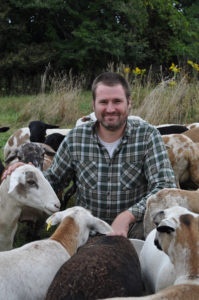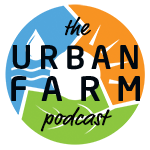370: Steve Gabriel on Forest Farming.
Guarding forests as a valuable part of the agriculture system.
 Steve is an ecologist, forest farmer, and educator living in the Finger Lakes Region of New York State. He passionately pursues work that re-connects people to the forested landscape and supports them to grow their skills in forest stewardship.
He is an Agroforestry Extension Specialist for the Cornell Small Farm Program and co-owns Wellspring Forest Farm & School with his wife Elizabeth, where they produce mushrooms, maple syrup, duck eggs, pastured lamb, and elderberry extract, all from forest-based systems.
Steve is an ecologist, forest farmer, and educator living in the Finger Lakes Region of New York State. He passionately pursues work that re-connects people to the forested landscape and supports them to grow their skills in forest stewardship.
He is an Agroforestry Extension Specialist for the Cornell Small Farm Program and co-owns Wellspring Forest Farm & School with his wife Elizabeth, where they produce mushrooms, maple syrup, duck eggs, pastured lamb, and elderberry extract, all from forest-based systems.
The school hosts several educational programs each season with the goal of increasing people’s understanding of healthy forests and how they can play a critical role in their stewardship. He is the author of two books: Farming the Woods, and Silvopasture, both published by Chelsea Green.Don’t miss an episode! Click here to sign up for podcast updates
In This Podcast:
Being a farmer in these days of changing climate can be challenging, so when a severe drought threatened the livelihood of sheep farmer Steve Gabriel, he resorted to using previously ignored wooded areas. Examining the forest near his home he realized the bounty that he had been overlooking, and sought out more information about forest farming. He now teaches others how to do this natural farming process. There is a bonus on mushrooms too!
Listen in and learn about:
-
- Growing up at the end of a cul-de-sac and the forest he grew up exploring
- “We have this ecological footprint, but we can also leave a positive handprint on our ecosystems”
- Trying to rebuild the forest he grew up in
- Explaining silvopasture
- Explaining other terms like agroforestry, forest farming, and a few others
- Dealing with an historic drought in 2016
- Allowing the sheep to feed from the wooded areas
- How to re-examine our connection to the “wild” as farmers
- Land stewardship and how that is impacting our farming
- Observing climate change and taking note of the changes to note the resilient trees and plants
- “all canopies are not created equal”
- Reviewing his books and how the first one led into the second
- Opening our eyes into the greater world within the forest
- His favorite mushroom – winecap mushrooms – stropharia rugoso-annulata
- A mushroom resource: cornellmushrooms.org
- His challenge to listeners to grow mushrooms in their own space
- The mycelium beneath the soil that continues to grow after mushroom harvesting
- Wellspring Forest Farm and School in central New York
As well as:
His failure – managing someone else’s farm and not having clear understanding and expectations
His success – being an educator and passing on knowledge
His drive – a sense of stewardship or responsibility
His advice – Be patient, start slow and small.
Books written by Steve:
Farming the Woods: An Integrated Permaculture Approach to Growing Food and Medicinals in Temperate Forests with Ken Mudge
Steve’s Book recommendations:
Braiding Sweetgrass: Indigenous Wisdom, Scientific Knowledge and the Teachings of Plants by Robin Wall Kimmerer
Organic Mushroom Farming and Mycoremediation: Simple to Advanced and Experimental Techniques for Indoor and Outdoor Cultivation by Tradd Cotter
Videos – woodlanders – mushroom farm in japan
How to reach Steve:
Websites: FarmingTheWoods.com
UrbanFarm.org/wellspring
*Disclosure:
Some of the links in our podcast show notes and blog posts are affiliate links and if you go through them to make a purchase, we will earn a nominal commission at no cost to you. We offer links to items recommended by our podcast guests and guest writers as a service to our audience and these items are not selected because of the commission we receive from your purchases. We know the decision is yours, and whether you decide to buy something is completely up to you.





